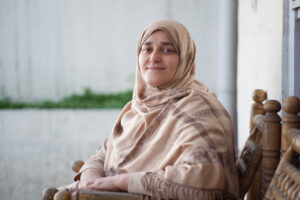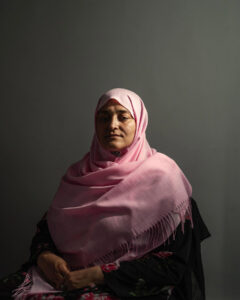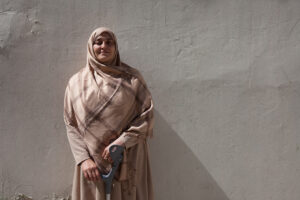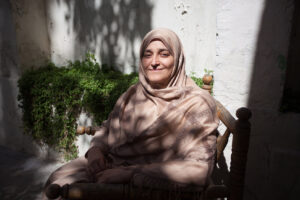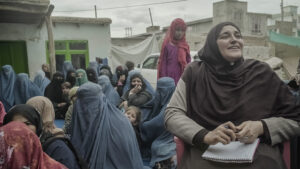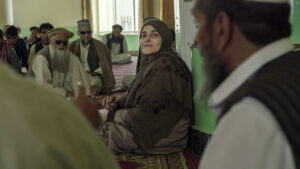A Distant Dream of a Better Future
By Julia Reysner
Jamila Afghani is an educator and human rights defender who was named 2017 Aurora Humanitarian for her exceptional achievements in empowering the girls and women of Afghanistan. As founder of the Noor Educational and Capacity Development Organization (NECDO), she has dedicated over 25 years of her life to making sure the women of Afghanistan have access to education and a clear sense of their rights. Just when it seemed that the tide of patriarchal oppression was finally about to turn, the Taliban took over her country. Jamila Afghani was forced to flee her homeland – but she hasn’t given up on its people.
In late August 2021, the world watched in horror as thousands of Afghanis were desperately trying to get to the Kabul airport to escape the rule of the Taliban. Among them was Jamila Afghani, who had a good reason to fear for her life. “Everybody was telling me to get out of the country. I was stuck in Kabul, trying to get to the airport, but because of all those crowds, we were not able to get inside,” she recalls. “I had 11 countries’ visas in my passport, but there was no way to get inside the terminal.” Maria Butler, her friend and colleague from Women’s International League for Peace and Freedom, worked around the clock, barely getting any sleep until she managed to get her safely evacuated to Norway.
Heartbreakingly, this was not the first time Jamila Afghani was forced to leave her homeland. The first came during the Soviet-Afghan War when Jamila was just a kid and her parents took her to Peshawar, Pakistan. After returning to Afghanistan, she gave everything to empowering women – only to watch most of her achievements being ruthlessly trampled into the ground 25 years later. How do you survive such a shock? How do you even describe it? Jamila Afghani’s voice is full of emotion as she struggles to put her devastating loss into words: “It is a great tragedy. Like many other women, I invested all of my time in my work to bring a positive change to the country. With the coming of Taliban, everything is closed. We will have to start everything from zero now.”
“Where we were previously not allowed to have a single woman, we were pushing for being present on different levels.”
Before the Taliban came, Jamila Afghani and her organization, NECDO, had had more than 100,000 women enrolled in literacy programs. They did it by establishing a small center in one community and educating a certain number of local women that would later start their own centers. “It was spreading like a bubble,” explains Jamila. “We also pushed for women engagement in the peace process, and it was a success, too. Where we were previously not allowed to have a single woman, we were pushing for being present on different levels.”
NECDO dealt with another big issue innate to most patriarchal societies – domestic violence. “We have provided legal aid and psychosocial support to more than 10,000 women suffering from abuse from a family member or a partner. We also got into building a grassroots movement for women who have always been living with war to help them connect with each other and raise their voice for inclusive peace and the meaningful participation of women.”
All their hard work brought amazing results. Jamila Afghani managed to loosen, if not cut, the Gordian knot of religious customs and traditional limitations restricting local women’s every move. “Afghanistan is a patriarchal country, so we wanted to have men on our side to get better support in our society,” says the activist. “We established a network of 6,000 male ulema, or religious scholars, to stand beside us and promote women’s rights in Afghanistan. And we were able to support more than 2,000 youths, especially in terms of building their capacity in different professional fields and finding employment.”
The global pandemic of COVID-19 delivered a hard blow to NECDO’s activities but did not stop them completely. “In a country where the economy was already collapsing with poverty and lack of resources, the situation got extremely worse with COVID. But up to some extent, we were successful dealing with it.” Through volunteers, NECDO distributed sanitizers and helped women with disabilities, many of whom have lost access to their caretakers because of the disease. Jamila had contracted the virus, too, and it took its toll on her health, especially her memory, she says.
Now, uprooted and flung far away from her long-suffering homeland, she feels weary but is never idle. Thanks to the experience of powering through quarantine, the NECDO team has acquired some skills of working remotely that came in handy. “I’m connected to my colleagues through emails, through Zoom and technology, but physically, I’m not there,” laments Jamila. “Despite all the circumstances, our office is working in Afghanistan at the moment, although we are not doing many outdoor activities out of fear of the Taliban. But at least we are in a position to save the lives of female human rights defenders.”
The situation on the ground is ‘very bad,’ according to the activist. The doors of schools remain tightly locked to women and teenage girls, in direct contradiction to the promises made earlier by the Taliban. Victims of domestic abuse have no access to the legal system, and about 1,000 divorce cases that had already been processed have been reversed, with women forced to go back to their abusive husbands and live with them. The Ministry of Women Affairs was replaced by Ministry for the Promotion of Virtue and Prevention of Vice. Unemployment is a big challenge. The majority of highly qualified women – former engineers, judges, professors, government employees – are sitting at home, but even there, they are not safe.
“Recently, we were helping a group of 200 women who had been working as teachers and government or international NGO employees. The story of each and every woman is heartbreaking,” says Jamila. “One of them has a PhD. She had been teaching in a university for 12 years, but now, she is stuck at home. Her husband beats her. After she sent me pictures, I cried all day. We had about 500 women-led businesses, small and medium. We are supporting financially a few of them – very few – but it’s really difficult. Everybody is in survival mode and struggling.”
“I have my life, my connection to my country. I want to apply my experience and the knowledge that I have to build our country.”
It is clear that being away from Afghanistan causes Jamila Afghani almost physical pain, particularly when she starts talking about the women who need her. “Usually, when women were coming to me and crying to me, I was hugging them and giving them the feeling that I was beside them. I was holding their hand. I was trying to solve their problems. I miss that. I was a source of hope for many women, but I was taken away from them,” she says softly. “If I have the confidence that the Taliban will allow us to work, to contribute to our society, I will go back. I have my life, my connection to my country. I want to apply my experience and the knowledge that I have to build our country.”
But a possibility to return home soon seems unlikely, so for now, she must continue to help others from the distance. As she names all the ways in which she and her organization are still able to support the women of Afghanistan, Jamila’s face lights up with pride. “We are still working. Our organization held several press conferences in the seven months since the Taliban takeover. We invited all national and international media, and we raised our voices about education, domestic violence, and many other issues. We are providing financial aid to the human rights defenders, journalists, advocates. We are also working with some of the businesswomen, and we are working with women professionals that have now lost their jobs. We are providing food support to the vulnerable families,” she says.
However far Jamila Afghani may be from her home, her heart is still there, with her people. And knowing that she is fighting for their future is a consolation in its own right – for both parties
